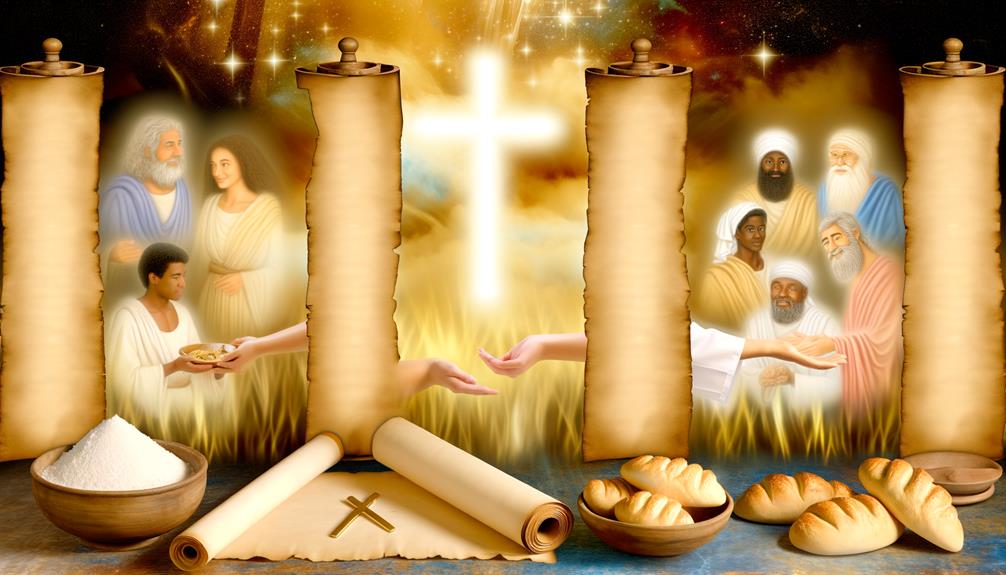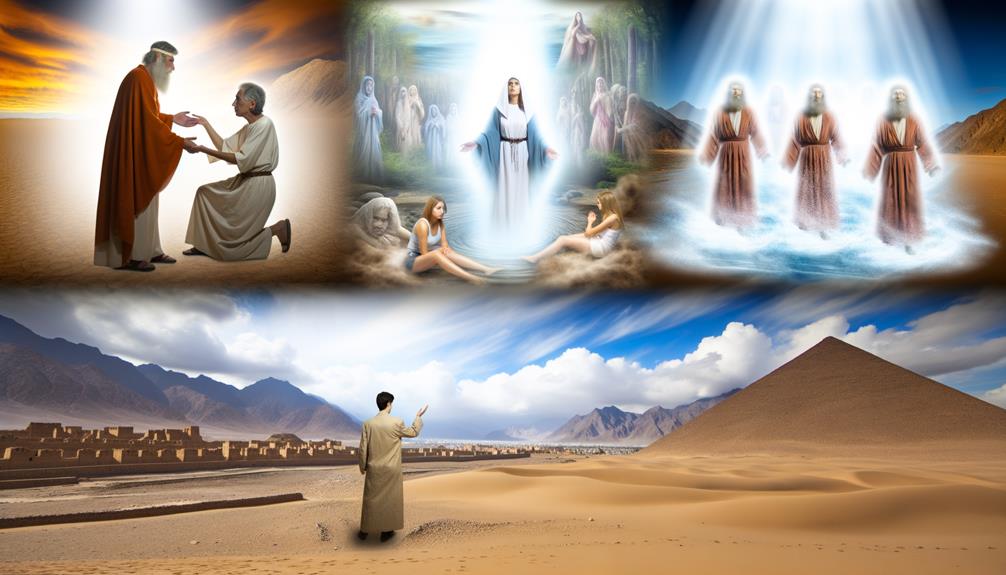Deeds Meaning In The Bible: Actions and Faith
In biblical theology, deeds encompass actions reflecting one’s faith and covenantal relationship with God. In the Old Scripture, deeds often correspond to obedience to Mosaic Law and divine ordinances, with blessings or curses contingent upon Israel’s fidelity (Deuteronomy 28).
Prophets’ miraculous and symbolic actions convey God’s authority and message. Jesus’ teachings, such as in the Parable of the Good Samaritan, underscore the necessity of good deeds as manifestations of genuine faith (Matthew 7:21).
The New Scripture further stresses the inseparable link between faith and works (James 2:17), illustrating that righteous deeds are integral to Christian discipleship. Explore further to deepen understanding of this intricate doctrine.

Deeds Meaning in the Bible: Actions, Faith, and Divine Judgment
| Aspect | Description |
|---|---|
| Definition | Actions or works performed by individuals |
| Biblical Greek Term | Ergon – work, labor, or action |
| Key Scriptures | James 2:17, Romans 2:6, Revelation 20:12 |
| Faith and Works | True faith is demonstrated through righteous deeds |
| Salvation Perspective | Salvation is by grace, but deeds reflect genuine faith |
| Judgment Context | God judges each person according to their deeds |
| Symbolism | Evidence of inner beliefs and spiritual maturity |
| Relevance Today | Encourages living out faith through compassionate and moral actions |
Deeds in the Old Testament

In the Old Scripture, deeds are intricately tied to the covenantal relationship between God and His people, often serving as tangible expressions of faithfulness or disobedience.
For instance, in Deuteronomy 28, blessings and curses are explicitly linked to the Israelites’ actions, underscoring the critical importance of obedience to God’s commandments.
The narrative of Cain and Abel (Genesis 4:3-7) illustrates how deeds reflect the heart’s condition, with Abel’s acceptable offering contrasting sharply with Cain’s rejected gift.
Additionally, the Mosaic Law (Exodus 20-23) codifies moral and ceremonial deeds, delineating righteous conduct.
In such contexts, deeds are not merely external actions but are deeply intertwined with covenantal fidelity, reflecting an ongoing dialogue between divine mandate and human response.
Acts of the Prophets

The acts of the prophets in the Bible encompass miraculous deeds, such as Elijah’s confrontation with the prophets of Baal (1 Kings 18:20-40), and symbolic actions like Ezekiel’s dramatizations of Jerusalem’s siege (Ezekiel 4:1-3).
Additionally, there are deeds of compassion exemplified by Elisha’s provision of oil for a widow (2 Kings 4:1-7).
These actions serve not only as divine interventions but also as profound theological statements, reinforcing God’s covenantal relationship with His people.
Through these diverse acts, the prophets convey messages of judgment, hope, and divine mercy.
Miraculous Acts Displayed
Prophets in the Bible, such as Moses and Elijah, performed miraculous acts that underscored their divine authority and the power of God.
These acts, documented in scriptural texts, served as tangible manifestations of God’s intervention in human history.
For instance, Moses parting the Red Sea (Exodus 14:21-22) and Elijah calling down fire from heaven (1 Kings 18:38) exemplify divine miracles that reinforced their prophetic legitimacy.
These wonders not only demonstrated God’s supremacy but also validated the prophets as His chosen messengers.
By performing acts beyond human capability, these prophets highlighted the divine nature of their mission, thereby fostering faith and obedience among the people.
Such miracles remain pivotal in theological discussions about divine intervention and prophetic authority.
Prophetic Symbolic Actions
Prophetic symbolic actions, often referred to as enacted prophecies, served as profound visual metaphors that communicated divine messages to the people of Israel. These acts were not mere theatrics but carried significant theological weight, illuminating God’s intentions, judgments, and promises.
For instance, Isaiah walked barefoot and naked for three years as a sign against Egypt and Cush (Isaiah 20:2-4). Similarly, Ezekiel’s act of lying on his side for 390 days symbolized the siege of Jerusalem (Ezekiel 4:4-6). These actions engaged the senses, compelling the audience to grasp the gravity of the prophetic word.
| Prophet | Symbolic Action | Scriptural Reference |
|---|---|---|
| Isaiah | Walked naked and barefoot | Isaiah 20:2-4 |
| Ezekiel | Laid on his side | Ezekiel 4:4-6 |
| Hosea | Married a prostitute | Hosea 1:2-3 |
| Jeremiah | Wore a yoke | Jeremiah 27:2-11 |
| Amos | Basket of ripe fruit | Amos 8:1-2 |
Deeds of Compassion
While prophetic symbolic actions conveyed divine messages through vivid metaphors, the deeds of compassion performed by prophets exemplified God’s love and mercy in tangible ways.
Elijah’s provision for the widow of Zarephath (1 Kings 17:8-16) and Elisha’s healing of Naaman (2 Kings 5:1-14) demonstrate acts of divine compassion that transcended cultural and ethnic boundaries.
These actions not only fulfilled immediate needs but also revealed God’s inclusive nature and concern for all humanity.
Isaiah’s call to care for the oppressed (Isaiah 1:17) and Jeremiah’s advocacy for social justice (Jeremiah 22:3) further underscore the prophetic mission to embody divine compassion.
Such deeds serve as enduring testimonies of the prophets’ role as vessels of God’s mercy and love.
Jesus’ Teachings on Deeds

In the teachings of Jesus, as recorded in the Gospels, the significance of deeds is underscored through numerous parables and direct instructions, emphasizing that actions reflect the true nature of one’s faith.
For instance, in the Parable of the Good Samaritan (Luke 10:25-37), Jesus illustrates that genuine love for one’s neighbor is demonstrated through compassionate action.
Similarly, in Matthew 7:16-20, Jesus teaches, ‘By their fruit you will recognize them,’ indicating that righteous deeds serve as evidence of a true disciple.
Additionally, in the Sermon on the Mount (Matthew 5-7), Jesus exhorts believers to let their ‘light shine before others, that they may see your good deeds and glorify your Father in heaven’ (Matthew 5:16).
Disciples’ Works and Miracles

The Acts of the Apostles records numerous instances where the disciples, empowered by the Holy Spirit, performed extraordinary works and miracles, echoing the ministry of Jesus Christ.
Notable among these are the healing of the sick (Acts 3:6-8), the feeding of multitudes (Matthew 14:19-21), and the raising of the dead (Acts 9:36-42).
These deeds serve not only as manifestations of divine power but also as tangible affirmations of the disciples’ faith and their mission to spread the Gospel.
Healing the Sick
Throughout the New Covenant, the disciples’ works and miracles, particularly their acts of healing the sick, serve as a demonstration to the divine authority and power bestowed upon them by Jesus.
Instances such as Peter healing Aeneas (Acts 9:32-35) and Paul curing the cripple in Lystra (Acts 14:8-10) underscore the apostles’ role as instruments of God’s will.
These miracles not only validated their divine commission but also reinforced the message of the Gospel.
Healing acts, as seen in the Gospels and Acts, were tangible manifestations of Jesus’ compassion and the Kingdom of God’s nearness (Matthew 10:8).
Consequently, the disciples’ healing ministry was integral to their witness, embodying the transformative power of faith and divine intervention.
Feeding the Multitudes
How did the miraculous feedings, such as the feeding of the five thousand (Matthew 14:13-21) and the four thousand (Mark 8:1-9), exemplify the disciples’ participation in the divine provision and the manifestation of God’s Kingdom?
These miracles illustrate the disciples as both recipients and conduits of divine power. Jesus gave thanks, broke the bread, and handed it to His disciples to distribute, symbolizing their active role in God’s work.
| Event | Scriptural Reference |
|---|---|
| Feeding of the Five Thousand | Matthew 14:13-21 |
| Feeding of the Four Thousand | Mark 8:1-9 |
| Symbolic Significance | Divine Provision, Kingdom |
Through these acts, the disciples facilitate a tangible experience of God’s abundance, reinforcing their mission to preach and enact the Kingdom of God.
Raising the Dead
Miracles of resurrection performed by the disciples, such as Peter raising Tabitha (Dorcas) from the dead (Acts 9:36-42), serve as profound affirmations to the divine authority bestowed upon them and the transformative power of faith in the early Christian community.
These acts of resurrection go beyond mere physical revival; they symbolize the victory of life over death through Christ. In John 11:25-26, Jesus declares Himself the ‘resurrection and the life,’ and the disciples’ miraculous works affirm this divine promise.
The raising of the dead by the disciples is not only a manifestation of their spiritual empowerment but also a confirmation to the continuing presence and action of Christ in His followers, further solidifying the foundation of Christian belief.
Faith and Actions

In the context of the Bible, faith and actions are intricately linked, as evidenced by James 2:17, which states that ‘faith by itself, if it is not accompanied by action, is dead.’ This verse underscores the necessity of deeds as tangible expressions of one’s faith.
The Epistle of James further elucidates this concept by citing the examples of Abraham and Rahab, whose actions were seen as manifestations of their faith (James 2:21-25).
Theologically, such a perspective insists that genuine faith naturally produces works of righteousness. Consequently, scriptural teachings advocate for a symbiotic relationship between belief and behavior, asserting that faith without corresponding deeds is incomplete and ineffective.
This doctrinal view fosters a holistic approach to spiritual life, integrating both conviction and conduct.
Consequences of Deeds

The consequences of deeds, as articulated in biblical scripture, underscore the principle that one’s actions yield both temporal and eternal ramifications. Scripture is replete with verses emphasizing the significance of our actions.
For instance, Galatians 6:7-8 warns, “Do not be deceived: God cannot be mocked. A man reaps what he sows.” This underscores the intrinsic link between actions and their outcomes. Similarly, Ecclesiastes 12:14 asserts, “For God will bring every deed into judgment, including every hidden thing, whether it is good or evil.”
| Deeds | Consequences |
|---|---|
| Righteous Acts | Eternal life, divine favor (Matthew 25:46) |
| Wicked Acts | Judgment, eternal punishment (Romans 2:6-8) |
| Compassion | Reward, mercy (Proverbs 19:17) |
| Sinful Acts | Separation from God, spiritual death (Isaiah 59:2) |
Such verses elucidate the profound impact of our deeds on both our present existence and eternal destiny.
Deeds and Salvation

Understanding the relationship between deeds and salvation necessitates a thorough examination of scriptural teachings that delineate how actions correlate with one’s eternal fate.
Ephesians 2:8-9 emphasizes that salvation is by grace through faith, not by works, preventing any grounds for boasting.
However, James 2:17 asserts that faith without deeds is dead, illustrating that genuine faith produces righteous actions.
This harmonious interplay is further elucidated in Matthew 7:21, where Jesus states that not everyone who calls Him ‘Lord’ will enter the kingdom of heaven, but only those who do the Father’s will.
Consequently, while salvation is a gift of grace, the transformative power of faith inevitably manifests in deeds, underscoring both the integrity of belief and the necessity of action.
Conclusion
The biblical concept of deeds encompasses a diverse range of actions, from Old Covenant narratives to New Covenant teachings.
Significantly, Jesus emphasized the symbiotic relationship between faith and actions, a theme echoed by His disciples. According to James 2:17, ‘faith by itself, if it is not accompanied by action, is dead.’ This underscores the theological assertion that deeds are integral to salvation.
Astoundingly, over 2,000 verses in the Bible address the significance of deeds, highlighting their paramount importance in scriptural doctrine.






